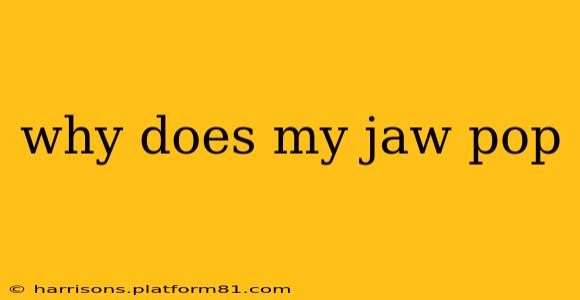Experiencing a popping jaw can be disconcerting, but it's a surprisingly common issue. The popping sound often originates from your temporomandibular joint (TMJ), the hinge connecting your jawbone to your skull. This complex joint allows for a wide range of jaw movements, from chewing and talking to yawning and singing. When this joint malfunctions, it can lead to a variety of symptoms, including that tell-tale popping sound. Let's explore the potential reasons behind this clicking or popping sensation.
What Causes a Popping Jaw?
Several factors can contribute to a popping or clicking jaw. The most common culprit is a temporomandibular joint disorder (TMJD). TMJD is an umbrella term encompassing a range of conditions affecting the TMJ and surrounding muscles. While the exact cause is often multifaceted, some key contributing factors include:
-
Dislocation of the articular disc: The TMJ contains a disc of cartilage that acts as a cushion between the jawbone and the skull. If this disc becomes displaced or misaligned, it can create a popping sound as it slips back into place during jaw movement. This is often the primary cause of a popping jaw.
-
Inflammation: Inflammation of the TMJ and its surrounding tissues (synovitis) can lead to both pain and popping. This inflammation might be triggered by arthritis, injury, or overuse.
-
Muscle spasms: Tight or spasming jaw muscles can also contribute to a popping sensation. This is often associated with bruxism (teeth grinding) or clenching.
-
Ligament laxity: The ligaments supporting the TMJ can become stretched or weakened, leading to instability and a popping sound. This can be caused by trauma or repetitive jaw movements.
-
Osteoarthritis: The degenerative effects of osteoarthritis can affect the TMJ, leading to both pain and popping. This is more common in older individuals.
How Can I Tell If It's TMJ?
While a popping jaw is often a symptom of TMJD, it's crucial to consult a healthcare professional for a proper diagnosis. Other symptoms often associated with TMJD include:
- Jaw pain: Pain in the jaw, temples, or face.
- Limited jaw movement: Difficulty opening or closing your mouth fully.
- Headaches: Frequent headaches, particularly those located in the temples or the back of the head.
- Earaches: Pain in the ear, often accompanied by a ringing sensation (tinnitus).
- Neck pain: Pain and stiffness in the neck and shoulders.
- Facial pain: Pain in the cheeks or around the jawline.
What If My Jaw Pops and I'm in Pain?
If your jaw popping is accompanied by pain, or if you're experiencing other symptoms like those mentioned above, you should seek medical attention. A dentist or oral surgeon specializing in TMJD can conduct a thorough examination and determine the underlying cause. They may utilize imaging techniques like X-rays or MRI scans to obtain a precise diagnosis.
How is TMJ Treated?
Treatment for TMJD varies depending on the severity and underlying cause. Non-invasive approaches often include:
- Lifestyle modifications: Avoiding foods that require excessive jaw movement, practicing stress-reduction techniques, and adopting proper posture.
- Over-the-counter pain relievers: Non-steroidal anti-inflammatory drugs (NSAIDs) can help manage pain and inflammation.
- Physical therapy: Exercises designed to improve jaw muscle strength and flexibility.
- Mouthguards: Custom-fitted mouthguards can help prevent teeth grinding and clenching during sleep.
In more severe cases, further intervention might be required:
- Medication: Muscle relaxants, antidepressants, or other medications may be prescribed to manage pain and inflammation.
- Injections: Corticosteroid injections can reduce inflammation in the TMJ.
- Surgery: In rare cases, surgery might be necessary to correct structural problems in the TMJ.
What Can I Do to Prevent a Popping Jaw?
While not all cases of a popping jaw are preventable, you can take steps to reduce your risk:
- Manage stress: Stress can exacerbate TMJD symptoms, so employing stress-reduction techniques is crucial.
- Maintain good posture: Poor posture can strain the jaw muscles.
- Avoid chewing gum excessively: Excessive chewing can put undue strain on the TMJ.
- Protect your teeth: Wear a mouthguard if you grind your teeth or participate in contact sports.
Remember, this information is for educational purposes only and should not be considered medical advice. Always consult a qualified healthcare professional for any concerns about your jaw or TMJ. They can provide an accurate diagnosis and develop a tailored treatment plan to address your specific needs.
